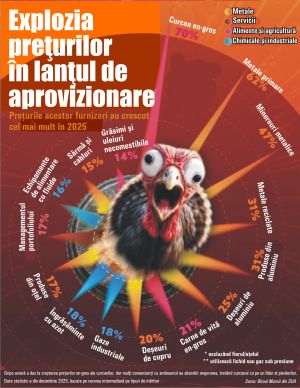The first government round within a political coalition marked the second half of last year not through the lens of exceptional results, but through the continuation of taking measures that had a negative impact on the business environment, in order to reduce the budget deficit increased by the unjustified increase in public spending. The change of government at the end of the first semester did not bode well for Prime Minister Ciolacu's team, which found itself with a budget deficit that was increasingly difficult to control and manage, a problem over which the scandal also spread in the first month of government. asylums of horror" from Voluntari which led to the replacement of the ministers Gabriela Firea and Marius Budăi from the government, amplified in August by the explosion in Crevedia where corruption in the state showed its true face causing more victims.
In an attempt to control the budget deficit and not to risk the blocking of European funds, the Ciolacu Cabinet worked in the first three months of the second semester to draft a bill on the amendment of the Fiscal Code and the reform of the local and central public administration, forgetting to do the necessary budgetary rectification, a rectification that did not take place even at the end of the year, the sums needed for public authorities, local public administrations and public institutions being allocated directly from the Government Reserve Fund, in order to keep budgetary expenses under control.
Prime Minister Marcel Ciolacu assumed on September 26, in the plenary session of the Parliament, the law amending the Fiscal Code, despite the opposition expressed by the business environment, the social partners, but also by a part of the political class. The normative act passed the filter of the Constitutional Court and was promulgated during October by President Klaus Iohannis establishing, among other things, the minimum tax of 1% on turnover for companies whose annual turnover exceeds 50 million euros, the tax of 2% on bank turnover, lowering the turnover threshold for micro-enterprise taxation, applying a 10% tax - called CASS - on meal vouchers, introducing a luxury tax of 0.3% on residential properties that exceed the value of 2.5 million lei and on cars exceeding the value of 375,000 lei.
At the same time, because the purchasing power of the citizens decreased due to inflation, the Government decided, for 90 days, to limit the commercial addition to 14 basic foods, a limit that entered into force on August 1, 2023 and which was extended by another 90 of days, on October 27, 2023 when the Executive added 7 more basic foods to the initial list, including the winter holiday cake.
The fiscal measures, which also include the restructuring of the budget apparatus, have caused dissatisfaction among the employees of the public system, who have taken to the streets several times. Thus, employees from the public education system, from the public health system, as well as ANAF protested several times during the second semester of last year, due to the freezing or reduction of salaries and bonuses that they had until upon the entry into force of Law 296/2023 on new fiscal measures.
The second half of the second semester was marked by the preparation by the Government of the draft laws regarding the state budget and the state social insurance budget for the year 2024. The two draft laws were difficult to draft, due to budget cuts and reorganizations provided both in law 296/2023 and in the emergency ordinances that completed it, but in mid-December the Government approved the normative acts and sent them for debate and vote in Parliament. The laws passed quickly, on the fast-forward procedure, through the Legislature, despite the thousands of amendments submitted by the parliamentary opposition.
The only good news from a macroeconomic point of view came from the National Bank of Romania and the European Commission. In the second semester, the BNR kept the reference interest rate at 7% and predicted that inflation would reach 7.5% at the end of the year, while the European Commission approved the second payment request from the PNRR, handing over to the authorities in Bucharest 2.76 billion euros.
In the capital market, the end of the year brought us the replacement by the Parliament of the Nicu Marcu team at the head of the Financial Supervision Authority - the team that did not prevent the resounding bankruptcies of the City Insurance and Euroins Romania companies in the insurance market -, with the team led by Alexandru Petrescu, the new president of ASF. He is seconded by the first vice-president Gabriel Avrămescu and the vice-presidents Gabriela Horga, Daniel Armeanu and Sorin Mititelu, who have already initiated a package of measures aimed at restoring things to their natural state in the insurance market.
Politically, we record the approach of the National Anticorruption Directorate which led to the prosecution of former Prime Minister Florin Cîţu, the former Ministers of Health - Vlad Voiculescu and Ioana Mihăilă and the former Secretary of State at the Ministry of Health - Andrei Baciu - for a total damage of over a billion euro caused by approving the purchase of more doses of the anti-Covid 19 vaccine than were needed, despite the fact that there were many unused doses of the vaccine in stock.
For the second half of last year, we also note the agreement reached within the Justice and Home Affairs Council (JAI) of the European Union that Romania and Bulgaria will be admitted to the Schengen area with sea and air borders on March 31, 2024, but also the qualification of the men's national football team for the final Euro 2024 tournament, which will take place in Germany.
• The asylum scandal in Voluntari - the first test of the Ciolacu government
The ink did not even dry well on the oath signed in Cotroceni by the new government team that the Executive was shaken in the first month of government by the "horror asylums" scandal, which led to the resignation of ministers Gabriela Firea and Marius Budai, who were appointed by the opposition politics as the main ones responsible for the inactivity of the state institutions in the case of the bad treatment applied to the elderly in the three care centers for the elderly and not only within the radius of the city of Voluntari, Ilfov county.
The whole tragedy came to light on July 4, 2023 when DIICOT prosecutors descended on three social assistance homes - "Armonia", "Sfântul Gabriel cel Viteaz" and "Casa Cora" - in the city of Voluntari. Following the searches, 26 suspects were detained, who, according to DIICOT, had constituted a criminal network that had ill-treated and even tortured 98 people in the respective care centers. According to the prosecutors, the total damage was estimated at 5.2 million lei. Following the discovery of these cases, the Government ordered controls at the national level which revealed 51 unauthorized centers and which led to the suspension of activity in 110 social assistance centers out of the 5,197 centers that provide social services in our country.
A day before the descent of the DIICOT prosecutors into Voluntari, Eduard Hellvig resigned from the position of general director of the SRI, without his resignation having anything to do with what had happened in Voluntari. After his resignation, the "honorary" resignations of Marius Budai and Gabriela Firea followed, from the positions of Minister of Labor and Minister of the Family, respectively.
Also in July, the governing coalition, faced with a growing budget deficit and the non-collection of revenues programmed by the state budget law, considered taking measures regarding the increase of VAT for several goods and services - including those offered by the HoReCa sector - and the reduction of tax benefits granted in recent years to construction, IT&C and agriculture employees. That situation led the Ciolacu Government to postpone the budget rectification, wanting first to adopt the package of measures necessary for a rebalancing of the state budget.
• "Collective" in Crevedia and the tragedy in the town of 2 Mai - the main stops of the month of August
The explosion at an illegally operating LPG station in the town of Crevedia, a disaster in which six people died and 52 were injured, revealed in August the corruption within the Romanian state and the inefficiency of the work of some public institutions that must deals with the control and supervision of companies operating in certain economic sectors. Following the tragic incident that took place on August 26, several houses were destroyed, two people died and 58 people were injured, 12 of them very seriously, some of them being transferred to hospitals in Belgium, Germany, Norway, Austria and Italy. Later, four more seriously injured people were added to the list of deaths, who were intubated in the intensive care units of Bucharest hospitals. Of the total number of injured people, 43 are employees of the Ministry of Internal Affairs - 39 firefighters, two policemen and two gendarmes.
Following this tragedy, Prime Minister Marcel Ciolacu ordered the verification of all LPG stations in the country, an action that led to the discovery of over 2,000 deficiencies and the imposition of contravention fines that totaled over 1.3 million euros.
The above tragedy was preceded by another unfortunate event which was marked by the inactivity of the employees of the Constanţa County Police Inspectorate, which led to the death of two people and the injury of six more. On the night of August 18 to 19, where a drugged young man driving a car entered into a group of eight people on the side of the road, killing two and injuring the other six. Before the accident, which took place at around 5:00 a.m., the young man in question was stopped in traffic twice by the employees of the Traffic Police, who, although they noted his condition, did not retain his license and they let him continue to travel with the vehicle provided.
The month of August also revealed the flawed way in which the central authorities managed the public budget. Thus, the publication of the budget execution for the first seven months of 2023 showed that the Government was facing a budget deficit of 2.43% of GDP, which practically put us off the path of reaching, at the end of the year, the deficit target of 4.4 % of GDP previously agreed with the European Commission. In order not to jeopardize the European funds allocated to our country, the Ciolacu Cabinet completed during August and the first half of September a set of fiscal measures and a reform of the public system, which they discussed in Brussels with Commission officials European.
However, the measures designed to reform and restructure the public system have caused controversy, and ANAF employees and local public administration officials protested in front of the Government headquarters, requesting that the situation be analyzed in each authority and each public institution before the cancellation of some vacancies and the merger some institutions.
• September - the month in which Prime Minister Ciolacu assumed the new fiscal measures in Parliament
Threatened by the European Commission with the cutting of allocations from EU funds, the Ciolacu government had to, after inheriting the draft law on new fees and taxes throughout the summer season, go with it to the Parliament. According to the law assumed by Prime Minister Marcel Ciolacu on September 26 in Parliament, the taxation of banks changes so that they will pay a tax of 2% on turnover in 2024 and 2025, double the initial provision of 1%. At the same time, large companies, with turnovers exceeding 50 million euros, will have to pay a tax of 1% on turnover, if the tax paid on profit, accumulated from the beginning of the fiscal year/fiscal year and modified until the end quarter/calculation year, is lower than the minimum turnover tax. Moreover, the normative act also modifies the taxation of micro-enterprises, the respective economic agents being forced to pay, from January 1, 2024, the following taxes on profit: 1%, for micro-enterprises with revenues that do not exceed 60,000 euros; 3%, for micro-enterprises that achieve revenues over 60,000 euros or carry out certain activities, main or secondary, corresponding to specific CAEN codes. The government has decided to limit the application of the tax relief granted to employees in the IT&C sector until December 31, 2028 inclusive, as well as the tax relief granted to the construction, agricultural and food industry sectors. Moreover, employees in the respective sectors of activity will also pay CASS contributions. As far as labor taxation is concerned, the law assumed in the Government Parliament establishes the 10% taxation - for CASS - of meal vouchers and holiday vouchers granted to employees.
Following the amendment of the Fiscal Code, the representatives of the Executive stated that they will end the 2023 budget year with a deficit of 5.5%, as opposed to the 4.4% assumed in 2020 in the discussions with the European Commission. In this sense, the Government received a breath of oxygen from the European Commission, which decided to approve the second payment request from the National Recovery and Resilience Plan and transferred to the Romanian state the 2.76 billion euros, representing the amount requested by Executive.
• Increasing budget deficit in mid-autumn
Unfortunately for the Ciolacu Cabinet, despite the new fiscal measures, the financial situation for the 3rd quarter published by the Ministry of Finance in October showed a deficit of 56.46 billion lei, respectively 3.55% of GDP, higher by 0, 6% of GDP against the deficit of 41.70 billion lei, respectively 2.96% of GDP for the first nine months of 2022. In the document drawn up by the Ministry of Finance, it was stated that total revenues amounted to 368.03 billion lei in the first nine months months of the current year, increasing by 11% (year/year), while the expenses of the general consolidated budget in the amount of 424.49 billion lei increased in nominal terms by 13.7% compared to the same period of the previous year.
In these macroeconomic conditions, the Board of Directors of the National Bank of Romania decided to maintain the reference interest rate at 7% per year, the interest rate for the credit facility (Lombard) at 8% and the interest rate related to the deposit facility at 6% .
Regarding future developments, Council members indicated that, according to new assessments, the annual rate of inflation will continue to fall until the end of 2023 in line with the medium-term forecast, published in the August Inflation Report, which predicted it to fall to 7.5% in December 2023, to 4.4% in December 2024 and to 3 .8% at the end of the projection horizon.
In October, we recorded the first visit to our country by Ukrainian President Volodymyr Zelenskiy, who arrived in Bucharest three days after the terrorist attacks that shook Israel on October 7, 2023 and that generated the current conflict taking place in the Gaza Strip. President Zelensky and his counterpart Klaus Iohannis signed a joint statement on October 10, 2023, which states that relations between Ukraine and Romania will develop on the basis of a Strategic Partnership, that the amount of Ukrainian grain transited through Romania will be increased from 2 million tons to 4 million tons per month, that Ukrainian pilots will be trained in the training center in our country to operate F-16 fighter jets, that it is necessary for Romanians in Ukraine to enjoy the same treatment from the authorities in Kiev like the Ukrainians in our country regarding the respect of rights and that the government in Kiev and the one in Bucharest will solve the problem of the artificial distinction between the Romanian language and the so-called "Moldovan" language.
• The purchase of Covid-19 vaccines - harmful for former Prime Minister Florin Cîţu
The Romanian political scene was shaken, in the second half of November, when the National Anticorruption Directorate requested the Parliament and President Klaus Iohannis to approve the criminal prosecution of the former Prime Minister Florin Cîţu and the former Ministers of Health, Vlad Voiculescu and Ioana Mihăilă for abuse of office in the case of the purchase of anti-Covid vaccines, for a damage estimated at one billion euros through the purchase of a larger amount of vaccine than was actually necessary. Former Prime Minister Florin Cîţu lost his parliamentary immunity on November 29, after the Senate plenary approved the DNA's request to start the criminal investigation on behalf of the current liberal senator. Two days before, President Klaus Iohannis granted the request of the General Prosecutor's Office and gave the go-ahead to start the criminal investigation for the two former Ministers of Health. Later, at the end of December, Andrei Baciu, former secretary of state at the Ministry of Health, who resigned from the position of president of the National Health Insurance Company, was also prosecuted in the same case.
In the last month of autumn, the government repaired the errors slipped into Law 296/2023 through which the new tax changes were implemented, among which were the limitation of cash payments between companies and the reduction of the daily cash ceiling. Thus, the Ciolacu Cabinet reverted to the initial measure, maintaining the old provisions that provide for a daily ceiling of 50,000 lei for each economic agent and maintaining cash payments at the level of 5,000 lei per day between economic agents and at the level of 10,000 lei per day for individuals. Out of the desire to compensate for the waiver of the reduction of the ceiling on cash payments and the daily checkout ceiling, the Executive approved a normative act by which it established the taxation with a minimum rate of 15% of the profit of large multinational and national groups or enterprises whose turnover annual consolidated is at least 750 million euros.
Also during November, at the initiative of the Government, the Parliament approved the new law on public pensions. According to the normative act, the pensions of over 4.7 million beneficiaries will be recalculated according to the new formula and will increase annually, on January 1, with the average rate of inflation plus 50% of the real increase in the average gross salary.
On a macroeconomic level, we note that the budget execution for the first ten months of 2023 published by the Ministry of Finance in November shows a budget deficit of 3.97% of GDP, i.e. 62.81 billion lei, a fact that led the respective ministry to resort to lending from the domestic banking system, but also from the population by issuing new state securities intended to attract another 5.675 billion lei to the state budget.
• The state budget, adopted before Christmas, despite the criticism expressed by the Fiscal Council
The end of the second financial semester recorded the adoption by the Parliament, before the Winter Holidays, of the state budget for 2024, which foresees an increase of the Gross Domestic Product by 3.4% and a cash budget deficit of 5% . According to the normative act adopted by the Parliament, the Gross Domestic Product will reach 1,734 billion lei at the end of 2024, the average monthly gross salary taken into the calculation of the state budget being 4,733 lei. State budget revenues (exclusive) are scheduled to increase in 2024 by 20% compared to 2023, and public expenditures are increased by 6.56%, in the conditions in which the budgetary impact of the pension increase will be 25 billion lei this year. The 20% increase in the exclusive revenues of the state budget is an unrealistic premise, according to the Fiscal Council's Opinion on the state budget law, a premise that risks leading to a larger budget deficit at the end of 2024 than the one estimated by the Government.
Before the adoption of the state budget, the National Institute of Statistics announced that at the end of November 2023 the inflation rate stood at 6.7%, and after the adoption of the law, the Ministry of Finance announced that the arrears of the general consolidated budget increased by 8.83%, in November 2023 , compared to October, for which it resorted in the last month of last year to the issuance of new discounted treasury certificates and new benchmark bonds through which it sought to attract approximately 4.52 billion lei from the capital market.
As far as the capital market is concerned, December brought a new leadership of the Financial Supervision Authority. Parliament, with one exception - Daniel Armeanu, vice-president for pension funds -, decided not to renew the mandates of the Marcu team, which, from the head of the ASF, impassively assisted the bankruptcy of two large companies in the insurance market - City Insurance and Euroins -, to the disruption of the RCA market and to illegal collusion in the capital market. Alexandru Petrescu, the new president of the ASF, stated, at the hearings in the Parliament, that such phenomena will no longer be tolerated in his mandate and that, together with the new management team, he will work so that the Authority fully complies with its legal obligations.
The end of the second financial semester also brought two good news. The first consists in the appointment of the former president of the Romanian Senate, Anca Dragu - former Minister of Finance in the Cioloş government -, as governor of the National Bank of the Republic of Moldova, a position she holds following her vote by the political majority in the Chisinau Parliament .
The second piece of good news came on December 30, when the Justice and Home Affairs Council (JHA) of the European Union announced that an agreement had been reached for Romania and Bulgaria to enter the Schengen area with air and sea borders from March 31 2024, but without offering a calendar regarding the accession with land borders.








































